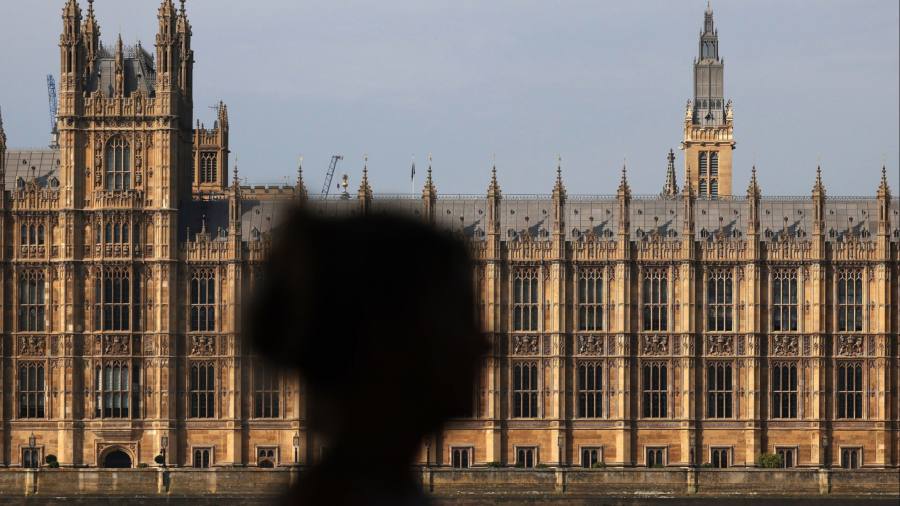Receive free UK politics updates
We’ll send you a myFT Daily Digest email rounding up the latest UK politics news every morning.
Good morning. There’s only one story that anyone in Westminster is talking about today: the arrest of a British parliamentary researcher on suspicion of spying for Beijing. It’s blown away any positive headlines that Sunak might have hoped from his G20. But more importantly, it reveals a big problem with the UK’s foreign policy aims more broadly. Some more on that below.
Eclipsed by the news
“Overshadowed” is one of those weasel words we political journalists like to use to mean “this story is much more fun or more interesting than the one that the government of the day would like us to write about”. In this case, “the Sunday Times scoop that a British parliamentary researcher has been arrested on suspicion of spying for Beijing is much more fun and interesting than Rishi Sunak’s time at the G20”. But this time the word really is appropriate, because the spy story really is overshadowing and damaging Sunak’s agenda.
One of the areas where Sunak’s government does represent a change in approach from the government of Boris Johnson is foreign policy. In the UK’s near-neighbourhood, he has abandoned long-running battles with the EU over the Northern Ireland protocol and taken the UK back into the Horizon scheme. Further afield, he has ratcheted down the UK’s Sinosceptic tilt. His foreign secretary James Cleverly became the first British foreign secretary to visit China since Jeremy Hunt in 2018.
What the exact political consequences of this story will be, will be shaped by what details end up in the public eye and what happens next. But already it has strengthened the Conservative party’s Sinosceptic wing and undermined Sunak’s attempt to reset the UK’s China policy.
But more importantly, it underlines one way that global politics has changed since the UK’s vote to quit the EU in 2016 — and not to the UK’s advantage. Just eight months before the UK’s Brexit vote, David Cameron was able to pose with Xi Jinping and a pint of beer, Xi met the Queen, and the country announced a new strategic partnership, and while all of this had some critics within the Conservative party and in Westminster as a whole, they were marginal. Now Sinoscepticism is the dominant school of thought in the Tory party and, in many ways, at Westminster.
In June 2016, Brexit didn’t have to mean being outside a series of increasingly forbidding trade walls, with sharp limitations on which way UK diplomats could face. In 2023 it does. That, as much as the shift in public opinion on the remain/leave issue, is one reason why the shape of the EU-UK relationship remains, as Martin Sandbu puts it in a smart column today, “unfinished business”.
Now try this
I had a frustrating weekend, with a cold that was exactly timed to knock me out from about 9pm on Friday to 5pm on Sunday. Which is a mercy, logistically speaking, but I was really looking forward to seeing Passages.
Now I’m at that stage where I feel well enough to work, but not so well that it doesn’t feel antisocial to come into the office. (I am not a homeworker by inclination.)
The one part of my weekend plans to survive intact was reading the FTWeekend. I particularly enjoyed Ludovic Hunter-Tilney on the contested memory of Amy Winehouse, Simon Willis on the threat to London’s plane trees and Anna Nicolaou on the remaking of the music industry in the age of streaming.
Speaking of streaming: let me know what I should be watching while I snuffle and sneeze my way to recovery!
Top stories today
-
Trade relations | Rishi Sunak and Narendra Modi have injected greater impetus into UK-India trade negotiations, instructing ministers and officials to work “at pace” to secure a deal, when they met on the margins of the G20 summit in New Delhi on Saturday.
-
Levelling up | For years, the key issue confronting many towns in northern England has been the decline in their manufacturing bases. In Barrow-in-Furness, Cumbria, the conundrum is different. The port town’s biggest employer BAE Systems has a full order book for the next 30 years.
-
No pension pledge | Rishi Sunak has refused to commit to having the so-called pensions triple lock in the next Conservative election manifesto, risking a backlash among Tory MPs.
-
Boom to bust | Birmingham, the UK’s second-largest city, has enjoyed one of the country’s fastest economic recoveries from the pandemic, attracting record levels of inward investment. But the boom is in stark contrast to the dire financial straits that its Labour-run local authority has found itself.
Read the full article here




